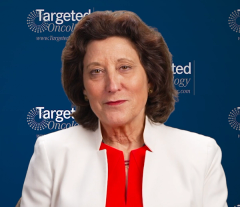
Selecting Optimal Second- and Third-Line Therapy for HR+/HER2- mBC
Dr Hope Rugo shares insight on how she approaches second-line and higher treatment selection in patients with HR+/HER2- metastatic breast cancer who experience disease progression on first-line therapy.
Episodes in this series

Case: A 57-Year-Old Woman with HR+/HER2- Metastatic Breast Cancer
Presentation
- A 57-year-old postmenopausal woman with a personal history of breast cancer presented with sternal pain during a followup appointment
Patient history
- She was diagnosed with stage I ER+/HER2- disease 8 years ago, at 49 years of age
- At the time, she was prescribed 5 years of adjuvant letrozole treatment, which she completed 3 years ago
Physical exam, clinical workup, and imaging
- Mid-sternum tenderness to palpation
- Slight elevation in ALP, all other lab testing unremarkable
- Bone scan showed uptake in sternum, scapula, lumbar spine, iliac crest
- Chest/abdomen/pelvis CT revealed sclerotic bone lesions
- Iliac bone biopsy confirmed ER+/HER2- metastatic breast cancer
- NGS on biopsy sample was negative for mutations
- ECOG PS=1
Treatment/followup
- The patient received letrozole and ribociclib as first-line treatment for metastatic disease
- 24 months after treatment initiation, CT showed enlargement of bone lesions and a single new 2-cm liver lesion
- Liquid biopsy/ctDNA testing revealed an ESR1 mutation
- The patient then started on elacestrant 345 mg once daily
Transcript:
Hope Rugo, MD, FASCO: We’re always trying to figure out how to balance different treatment options for patients in the second and third lines, in the hormone receptor–positive, HER2 [human epidermal growth factor receptor 2]–negative population. We’re looking at antibody-drug conjugates [ADCs], but these are chemotherapy agents. We’re trying to hold those until patients who have more progressive resistance to endocrine therapy and don’t have good endocrine therapy options remaining.
That said, there’s a lot of interest in using ADCs to debulk in patients who have very aggressive initial hormone receptor–positive, HER2- metastatic disease up front, but we have no data on that. Recommendations are still single-agent endocrine therapy with targeted agents. That’s essentially combination therapy. There’s been a move toward more combination therapy in the second- and third-line settings, with the idea that we might be able to enhance response.
The data we have with everolimus predate CDK4/6 inhibitors. That’s a bit of real-world data. With alpelisib, the alpha-specific PI3 kinase inhibitor, we have the 3-arm, nonrandomized BYLieve trial that suggests that there’s still efficacy of Alpelisib after progression on a CDK4/6 inhibitor. When we add targeted agents, we add toxicity. For a patient who has a PIK3CA mutation, I’d think about using a PI3 kinase inhibitor. We expect that in 2023, we’ll have capivasertib as another targeted agent, the AKT inhibitor. Everolimus remains a stalwart.
The biggest question facing us as oral SERDs [selective estrogen receptor degraders] begin to hit the market—we have 1, elacestrant—is which patients will we use a single-agent endocrine therapy for? If a patient who has ESR1 mutation but doesn’t have very aggressive, rapidly progressive, up-front endocrine-resistant disease is a good candidate for this, because you can still go on combination-targeted agents after elacestrant. There’s a study ongoing, the ELEVATE trial, which is treating patients to receive elacestrant in combination with all the targeted agents you can think of, to look at safety and efficacy in that patient population. That’s going to help us a lot. The ongoing trials with oral SERDs and other agents, like PROTAC, are looking at combinations with different targeted agents as well, so they may be able to hit the ground running when they’re approved in the next few years. There’s a lot of interest in combining oral SERDs with targeted agents.
One thing we’ve learned with oral SERDs is that when you’re giving an oral drug, there’s metabolism that you have to keep in mind. We have to understand what the oral SERDs do to the metabolism with exposure to all these targeted agents, including CDK4/6 inhibitors, AKT inhibitors, PI3 kinase inhibitors, and mTOR inhibitors—all the agents we use.
Recently, there were some data that giving palbociclib with the PROTAC ARV-471 markedly increased exposure to palbociclib, so you have to start at a lower dose. These data are important. You can’t just add everything together with impunity. With the data we have, we decide to use elacestrant in a patient with an ESR1 mutation, who doesn’t have rapidly progressive disease and has had at least some duration of response to endocrine therapy and a CDK4/6 inhibitor.
Transcript edited for clarity.








































